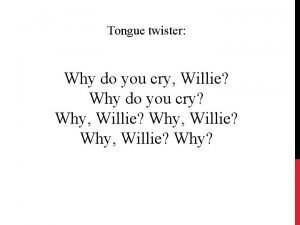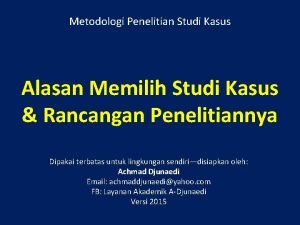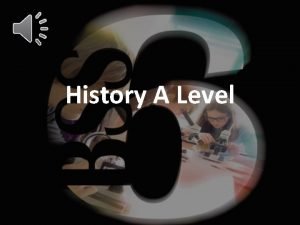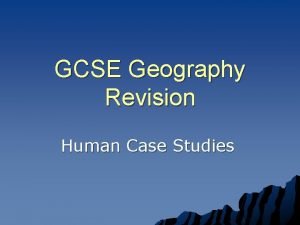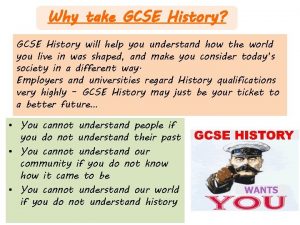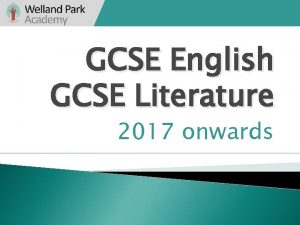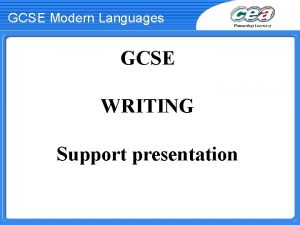History GCSE Why study history In history you





- Slides: 5

History GCSE Why study history? • In history you will be taught the skills of understanding and analysing sources, recalling and selecting information, building a logical argument and developing sensitivity towards historical problems. • You will also be given opportunities to develop their research, presentation and communication skills. • It is a well-regarded subject by employers and universities.

History is VERY useful! It will tell people certain things about you It will give you the skills employers want Organisation Time Keeping Make Judgements Evaluate Evidence Research Create an Argument Prioritise Think Objectively Up for a Challenge

So the BIG question. . . What will you LEARN? The GCSE is made up of 3 units containing 5 topic areas, all of which are assessed in 3 external examinations. The course builds on and extends knowledge and skills practised at KS 3 and supports progression to A-Level. The content covers the following units: Paper 1: Thematic study and historic environment • Crime and punishment in Britain, c 1000–present and Whitechapel, c 1870–c 1900: crime, policing and the inner city. (1 hour and 15 minutes). This paper is worth 30% of your GCSE grade. Paper 2: Period study and British depth study • Anglo-Saxon and Norman England, c 1060– 88 & Superpower relations and the Cold War, 1941 -91 (1 hour and 45 minutes). This paper is worth 40% of your GCSE grade (20% for each topic). Paper 3: Modern depth study • The USA, 1954– 75: conflict at home and abroad- Civil Rights and the Vietnam War. (1 hour and 20 minutes). This paper is worth 30% of your GCSE grade.

Things students should be aware of To succeed in GCSE history you MUST be able to: • Answer essay-style questions. These questions carry 12 or 16 marks – there are 2 of them on each paper. For these questions you need to be able to write answers in paragraphs that are 2 -3 pages long. • Reach a supported judgement. For at least one question on each paper you need to reach a decision about a reason or event and weigh it up and/or explain the relative importance of it. • Analyse different interpretations of an event or action. For this you will need to be able to explain HOW and WHY interpretations differ and reach a JUDGEMENT about which interpretation you most agree with. • Make inferences from sources and weigh up the usefulness of different sources.


